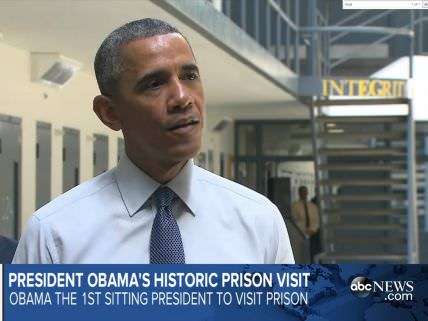Obama in Prison: 'There But for the Grace of God…'
The president still thinks drug offenders belong behind bars.

During his visit to a federal prison in Oklahoma yesterday, President Obama met with six inmates who are serving time for drug offenses and afterward told reporters it was not hard to imagine himself in their situation:
When they describe their youth and their childhood, these are young people who made mistakes that aren't that different from the mistakes I made, and the mistakes that a lot of you guys made. The difference is that they did not have the kinds of support structures, the second chances, the resources that would allow them to survive those mistakes.
I think we have a tendency to almost take for granted or think it's normal that so many young people end up in our criminal justice system. It's not normal. It's not what happens in other countries.
What is normal is teenagers doing stupid things. What is normal is young people who make mistakes. And we've got to be able to distinguish between dangerous individuals who need to be incapacitated [and] young people who are in an environment in which they are adapting, but if given different opportunities, a different vision of life, could be thriving the way we are. That's what strikes me. There but for the grace of God…
To some extent, Obama is exaggerating the risks he ran in his youth, as he did in his 1995 memoir Dreams From My Father. In that book he recalls smoking pot and snorting cocaine in high school and college; he says he even considered heroin before fear dissuaded him. "Junkie. Pothead," he writes. "That's where I'd been headed: the final, fatal role of the would-be black man." The notion that recreational drug users are always inches away from a fatal heroin addiction may be politically correct, but it is not accurate.
Still, it certainly is true that a misdemeanor marijuana or cocaine arrest in high school or college could have had a big impact on the course of Obama's life, probably stopping his political career before it began. It's also true that class as well as race affects both the likelihood of such an encounter with the criminal justice system and the severity of the consequences. That fact compounds the arbitrary injustices of the war on drugs, as Obama seems to recognize when he talks about the racially disproportionate impact of mandatory minimum sentences.
But Obama's critique of the war on drugs goes only so far. In his NAACP speech on Tuesday and during his prison visit yesterday, he said a sentence of life or 20 years is too harsh for a low-level drug dealer. Yet he still seems to think it's appropriate to lock such people in cages, perhaps for five or 10 years rather than 20 or life. The question is why. If their "mistakes…aren't that different" from the ones Obama made, why should the price they pay be so much higher? If people like the drug offenders who met with Obama are not "dangerous individuals who need to be incapacitated," why are they in prison at all?
Obama's push for criminal justice reform, though belated, is welcome, and the symbolism of being the first sitting president to visit a prison sends an important message: Politicians need to think about what happens to the human beings they blithely consign to such places. But a consistent application of the distinction Obama is implicitly drawing—between predatory criminals and people whose only offense is engaging in consensual transactions—implies that the prisoners Obama saw yesterday do not belong behind bars at all, not just that their sentences should be somewhat shorter.
The grace of God may account for the advantages that Obama and the reporters covering him had when they were growing up. But God has nothing to do with the decision to forcibly suppress the use of certain arbitrarily selected intoxicants and lock up people who dare to supply them. Prohibitionists like Obama are responsible for that.
